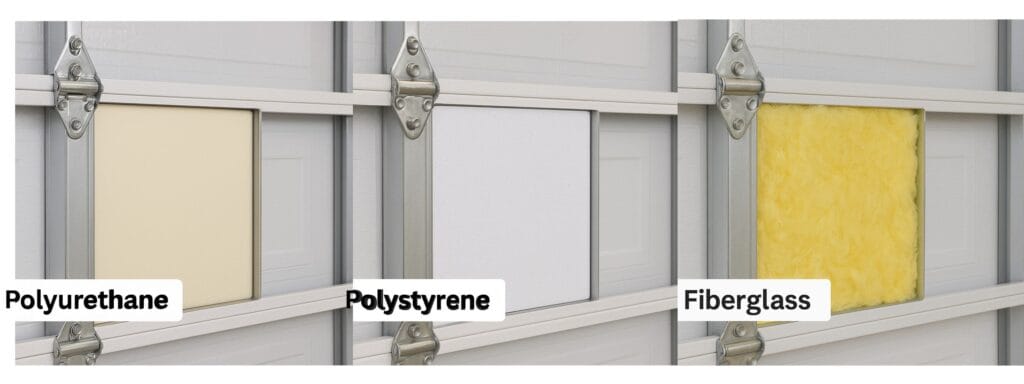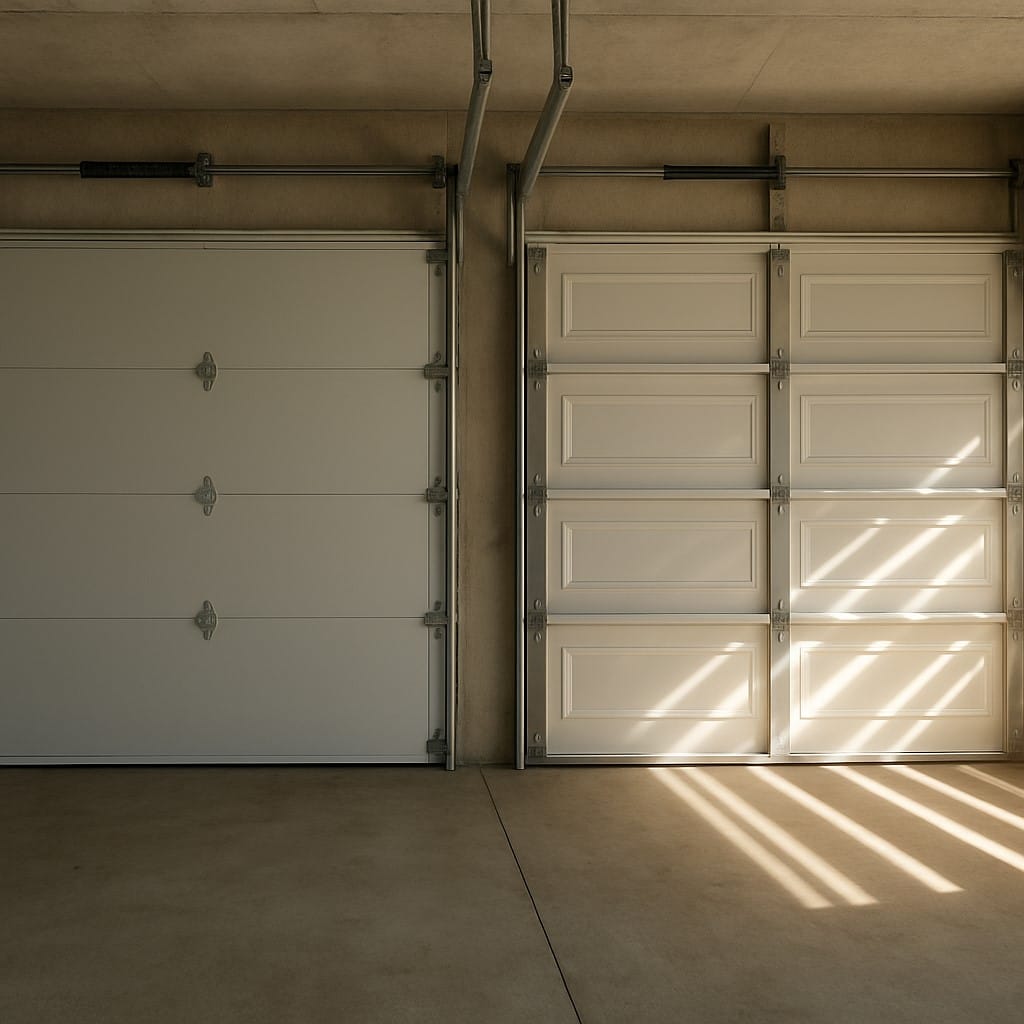Choosing the Best Insulated Garage Door for Central Texas Heat

It was mid-July in Mission, Texas, when the Rodriguez family reached out to us at Mission Garage Door Pros. Their garage was sweltering, with temperatures soaring past 110°F, turning their garage into an unbearable hotbox. It was affecting not only their comfort but also their home’s energy bills. The issue? A thin, non-insulated garage door that allowed heat to flood in. We replaced it with a high-quality insulated garage doors, and almost instantly, the garage space became cooler, quieter, and significantly more energy-efficient.
Here’s a fact to consider: According to the U.S. Department of Energy, about 30% of your home’s energy loss can occur through poorly insulated areas, including your garage. If your garage is attached to your home, and especially if you use it for storage, a workshop, or even a laundry room, keeping it thermally protected is critical, especially in the intense Central Texas summer.
Another customer, the Gutierrez family, had been using their garage as a home gym. They had installed a garage door opener and even connected it to smart controls through a logic board. But without proper garage door insulation, they couldn’t use the space during the hot months. After installing a premium polyurethane-insulated steel garage door, their garage was transformed into a year-round workout area.
Why Insulated Garage Doors Matter in Central Texas
Insulated garage doors are designed to block heat and cold by minimizing thermal transfer. This is especially important in Central Texas, where temperatures can fluctuate from freezing winter mornings to triple-digit summer afternoons. The key lies in the insulation material and the door types available.
Most garage doors come in two major insulation types: polystyrene and polyurethane. Polystyrene is a rigid foam that’s inserted into the door panels, while polyurethane is a dense spray foam that fills every crevice, offering better R-values (a measure of insulation performance). The higher the R-value, the more effective the door is at resisting heat flow and maintaining a stable indoor temperature.
Key Benefits of Insulated Garage Doors:
- Energy Efficiency: Reduced energy bills by improving the garage door’s ability to prevent heat transfer.
- Noise Reduction: A quieter garage environment thanks to thicker panels and foam cores.
- Temperature Regulation: Keeps your garage warmer in the winter and cooler in the summer.
- Increased Home Value: A new garage door is a smart investment, improving both curb appeal and energy efficiency.
- Durability and Security: Steel and aluminum doors with foam insulation offer improved structural integrity.
Exploring Insulation Materials: Which Is Right for You?
1. Polystyrene Insulation
This insulation material is cost-effective and commonly found in entry-level insulated garage doors. It offers basic thermal resistance and helps dampen noise. If you’re looking for an affordable insulation kit or are on a tight budget, polystyrene provides a decent solution. However, it may not completely seal gaps, leading to minor energy loss.
2. Polyurethane Insulation
This high-density urethane foam is injected into door panels, expanding to fill every corner. It offers a superior R-value, making it ideal for energy-efficient homes in hot climates. Polyurethane-insulated doors often come with steel or aluminum shells and are great for thermal insulation, durability, and noise reduction.
3. Fiberglass and Other Materials
Fiberglass is sometimes used in garage door insulation, particularly in insulation kits. It’s resistant to moisture and provides moderate R-values, but it can be less durable over time. It may suit garages that are used less frequently or where moisture is a concern.

Understanding R-Value and U-Value
- R-Value: The higher the r-value, the better the door insulates. Look for r-values between R-10 and R-17 for optimal heat insulation in Central Texas.
- U-Value: This measures thermal transfer. The lower the u-value, the better. It’s the inverse of r-value but equally important.
Think of it this way: If your garage door has a high r-value and low u-value, it’s effectively shielding your garage space from external temperatures.
Types of Insulated Garage Doors for Central Texas Homes
There’s a wide range of garage door types to choose from. Here’s a quick guide:
1. Sectional Doors
These are the most common in residential garages. They consist of horizontal panels connected by hinges, allowing smooth vertical operation. You can choose insulated sectional doors with polyurethane foam sandwiched between steel layers for maximum efficiency.
2. Single Doors vs. Double Doors
Whether you need a single door or a double door, insulation is key. Double garage doors can lose more heat, so investing in high R-value material like urethane foam is essential.
3. Custom Insulated Doors
You can also opt for custom insulated garage doors with unique finishes or materials like aluminum, wood composite, or steel. Brands like Amarr garage doors, Martin garage doors, and Clopay garage doors offer customizable, high-performance options.
Pros and Cons of Insulated Garage Doors
Pros | Cons |
Improves energy efficiency | Higher initial cost |
Reduces garage heat and noise | May require professional installation |
Enhances home value and garage usability | Heavier than non-insulated doors |
Prevents energy loss during extreme weather | Minor maintenance due to layered structure |
While non-insulated doors might seem cheaper, they often lead to higher energy bills, garage discomfort, and limited use of space during summer and winter. A properly insulated garage door offers a long-term return on investment.

Step-by-Step Guide to Choosing Your Insulated Garage Door
- Evaluate Your Needs: Is your garage attached to your home? Do you use it as a gym, workshop, or laundry room?
- Measure Your Space: Understand whether you need a single door or a double door, and assess door dimensions.
- Choose Insulation Material: Consider whether polystyrene, polyurethane, or fiberglass suits your needs.
- Compare R-Values: For Central Texas, look for R-values of at least R-10.
- Pick a Trusted Brand: Explore options from Clopay, Amarr, or Chamberlain garage doors.
- Factor in Your Budget: Weigh the cost of the garage door against expected energy savings.
- Get Professional Help: Insulated garage doors require precise installation, especially for foam panels and logic boards in garage door openers.
How Can Mission Garage Door Pros Help You?
Choosing the right insulated garage door for your home isn’t just about comfort, it’s about energy efficiency, protecting your valuables, and increasing your property’s value. At Mission Garage Door Pros, we specialize in helping Central Texas homeowners select, install, and maintain top-quality insulated doors that stand up to scorching heat, heavy weather, and long-term use.
Our expert technicians provide:
- Personalized garage door guides for selecting the best insulation.
- Access to leading garage door brands like Clopay, Amarr, and Martin.
- Full-service installation using top-grade insulation materials.
- Repairs on garage door openers, logic boards, and panels.
- Affordable pricing with a focus on long-term energy savings.
📍 Visit Us: 2301 N Shary Rd, Mission, TX 78674
📞 Call Today: (956) 997-9215
Don’t let the Texas heat invade your home call Mission Garage Door Pros now and get the perfect insulated garage door solution tailored for your space and needs!
Frequently Asked Questions (FAQs)
1. Will insulating my garage door affect my garage door opener’s performance?
No, but since insulated doors are heavier, it’s important to ensure your garage door opener is rated for the added weight to avoid strain on the motor.
2. Can I paint or customize the appearance of an insulated garage door?
Yes, many insulated garage doors come with paintable surfaces or customizable finishes that allow you to match your home’s exterior style.
3. Is it worth insulating a detached garage?
Yes, especially if you use the space for work, storage, or hobbies, insulation helps protect against temperature extremes and moisture buildup.
4. Do insulated garage doors require special maintenance?
They require the same maintenance as regular doors, checking hardware, cleaning tracks, and inspecting seals—but also benefit from periodic checks on insulation integrity.
